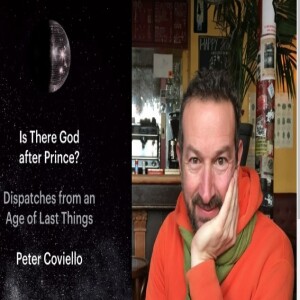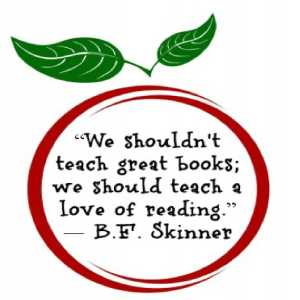
Episode 224 with Peter Coviello, Enthusiastic and Deeply Knowledgeable Critic and Celebrator of Moving Art, and Author of the Essay Collection, Is There God After Prince
 2024-02-20
2024-02-20
Notes and Links to Peter Coviello’s Work
For Episode 224, Pete welcomes Peter Coviello, and the two discuss, among other topics, his early relationship with music and bands that led him on a circuitous route to reading and writing, favorite individual and shared writers, the ways in which fandom and passion for books and music and the like grows and cements friendships, and salient topics from the book like The Sopranos as comfort watching and bringing Peter closer to his Covid-isolated family, the tonic and “jolt” that is passionate and talented artist, Prince as of this world and totally otherworldly somehow, and the visceral pleasures that come with love of the arts and love for the people who make and enjoy these arts.
Peter Coviello is a scholar of American literature and queer theory, whose work addresses the entangled histories of sex, devotion, and intimate life in imperial modernity.
A writer of criticism, scholarship, and literary nonfiction, he is the author of six books, including Make Yourselves Gods: Mormonism and the Unfinished Business of American Secularism (Chicago), a finalist for the 2020 John Whitmer Historical Association Best Book Prize; Long Players (Penguin), a memoir selected as one of ARTFORUM’s Ten Best Books of 2018; and Tomorrow’s Parties: Sex and the Untimely in Nineteenth-Century America (NYU), a 2013 finalist for a Lambda Literary Award in LGBT Studies.
His book, Vineland Reread (Columbia), was listed among the New York Times’s “New and Noteworthy” titles for January of 2021. He taught for sixteen years at Bowdoin College, where he was Chair of the departments of Gay and Lesbian Studies, Africana Studies, and English, and since 2014 has been at UIC, where he is Professor and Head of English. His newest book Is There God After Prince?: Dispatches from an Age of Last Things (Chicago), was selected for The Millions’ “Most Anticipated” list for 2023.
He advises work on 19th- and 20th-century American literatures and queer studies, as well as literary theory, religion and secularism, the history of sexuality, gender studies, poetry and poetics, modernism, and creative nonfiction.
Buy Is There God After Prince: Dispatches from an Age of Last Things
Peter's Website with University of Chicago
New City Lit Review of Is There God After Prince
At about 3:00, Cavatelli! Italian last names! Goodfellas references!
At about 5:00, Peter Coviello talks about his early relationship with the written word, and particularly how “worlds of music and imagination” got him into Rolling Stone and William Faulkner and other wonderful and catchy writing
At about 9:10, Peter highlights the “jolt” and “discovery” of young people/students and coins (?) the term “quotidian miraculousness” that comes with teaching literature
At about 10:50, Pete references the liner notes of Rage Against the Machine albums, as he and Peter discuss talking about great books and other artistic appraisals
At about 12:20, Peter responds to Pete’s question about which writers have influenced him over the years, including more recent writers like Jessica Hopper and Helen Macdonald
At about 15:20, Peter talks about tangential connections to David Foster Wallace
At about 16:20, Peter talks about who he is reading in 2024, including Anna Burns and Sam Lipsyte
At about 19:00, Peter talks about seeds for his essay collections
At about 21:10, Pete and Peter nerd out about a favorite writer of Peter’s and a favorite professor of Pete’s
At about 24:15, Peter discusses love and sorrow and the ways in which critique is intertwined with love, especially when discussing art of all types
At about 25:55, The two discuss contrasts in love of art, and little victories in reading and fandom
At about 28:10, Pete highlights “not nothing” and “and yet” as so crucial and telling in the book
At about 29:20, Pete shouts out the book’s Introduction and he and Peter fanboy again over the Wussy song mentioned in the Intro, “Teenage Wasteland”
At about 31:10, The two talk about fandom and sharing great art, including Nirvana’s MTV Unplugged performance
At about 33:20, Peter sees grief in some well-known art and talks
At about 34:30, Peter explains what he sees as so beneficial and magic about discussions and “fights” about art
At about 39:00, The two discuss the collection’s title essay and the freedom and camaraderie and joy that came with Prince dance parties from 1999 Maine
At about 41:00, Peter speaks to the “otherworldliness” of Prince and gives background on his greatness and iconic status and how he was also of “carnality”
At about 42:30-Prince and Chappelle Show reference!
At about 43:30, The two discuss lively writing that comes off as funny and/or electrifying, like that of Paul Beatty
At about 46:00, The discussion revolves around the book’s second essay and Pavement , especially their song “Unfair”
At about 47:30, Peter connects the above song with a telling and profound and prophetic quote from Paul Beatty’s Slumberland
At about 48:50, Peter and Pete discuss algorithms and a chapter on a fun discussion/argument over Gladys Knight's "Midnight Train to Georgia"
At about 50:00, Pete highlights Peter’s complimentary writing about current songwriters and the two discuss Steely Dan as treated in the book, and the ways in which strong feelings on either side is mostly a healthy thing
At about 52:50, Peter gives background on how much of the book deals with his relationship with his stepdaughters and the “adjacency” of love and sorrow and how much art
At about 54:45, The two reflect on a meaningful essay about Derek Jeter’s “moment in time”
At about 56:15, The two discuss the three “John’s” of an important chapter and the “terrible double discovery of adolescence”
At about 58:00-Third Eye Blind and Justin Bieber and Chance the Rapper and other music is discussed for aesthetic qualities and connections to Peter’s relationships with his daughters
At about 1:00:05, My So-Called Life is referenced in connection with father-daughter conversations
At about 1:01:50, Chicago is highlighted and Anthony Wa Gwendolyn Brooks
At about 1:02:40, Peter reflects on how The Sopranos’ and its treatment in the book kept him close to his family in Covid lockdown
At about 1:05:10, Peter gives book information and ordering information
You can now subscribe to the podcast on Apple Podcasts, and leave me a five-star review. You can also ask for the podcast by name using Alexa, and find the pod on Stitcher, Spotify, and on Amazon Music. Follow me on IG, where I’m @chillsatwillpodcast, or on Twitter, where I’m @chillsatwillpo1. You can watch this and other episodes on YouTube-watch and subscribe to The Chills at Will Podcast Channel. Please subscribe to both my YouTube Channel and my podcast while you’re checking out this episode.
I am very excited that starting in February with Episode 220 with Neef Ekpoudom and this episode, I will have one or two podcast episodes per month featured on the website of Chicago Review of Books. The audio will be posted, along with a written interview culled from the audio. A big thanks to Rachel León and Michael Welch at Chicago Review-I’m looking forward to the partnership!
Sign up now for The Chills at Will Podcast Patreon: it can be found at patreon.com/chillsatwillpodcastpeterriehl
Check out the page that describes the benefits of a Patreon membership, including cool swag and bonus episodes. Thanks in advance for supporting my one-man show, my DIY podcast and my extensive reading, research, editing, and promoting to keep this independent podcast pumping out high-quality content!
This is a passion project of mine, a DIY operation, and I’d love for your help in promoting what I’m convinced is a unique and spirited look at an often-ignored art form.
The intro song for The Chills at Will Podcast is “Wind Down” (Instrumental Version), and the other song played on this episode was “Hoops” (Instrumental)” by Matt Weidauer, and both songs are used through ArchesAudio.com.
Please tune in for Episode 225 with Andrés N. Ordorica, author of the poetry collection At Least This I Know; his writing has been shortlisted for the Morley Prize for Unpublished Writers of Colour and the Saltire Society’s Poetry Book of The Year. How We Named the Stars, his first novel, was published on January 30.
The episode will air on February 27.
More Episodes
Create your
podcast in
minutes
- Full-featured podcast site
- Unlimited storage and bandwidth
- Comprehensive podcast stats
- Distribute to Apple Podcasts, Spotify, and more
- Make money with your podcast
It is Free
- Privacy Policy
- Cookie Policy
- Terms of Use
- Consent Preferences
- Copyright © 2015-2024 Podbean.com







